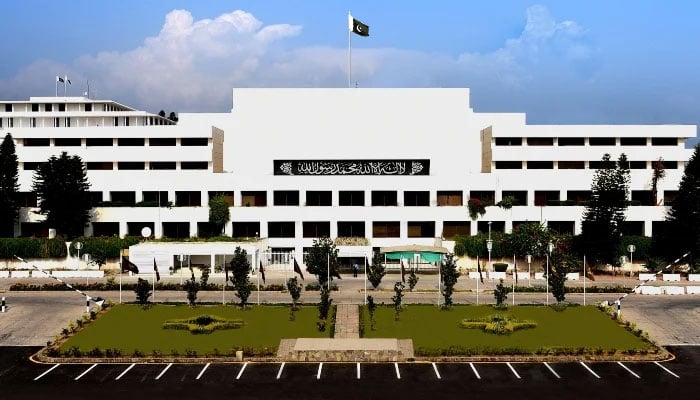Governance gap
LAHORE: Governments in Pakistan always lack the capacity to govern because they are deficient in regulations and are short of enforcement capacities needed to ensure that laws and rules are obeyed.
In such situations, businesses find it difficult to operate, and in many cases, civil courts do not function properly, denying innovative entrepreneurs the opportunity to claim the rewards of their ideas. Citizens in better-performing economies also have reservations about their government, yet these governments collect taxes and provide services in return that make their lives comfortable. These grumbling citizens may have complaints about their rulers, but they have no doubt in mind about the legal and regulatory system of their government. Their children attend high-standard public schools, and the healthcare and social security system ensures that even their elderly are properly looked after.
They enjoy the best infrastructure, full security, and protection, even in foreign countries. The developed governments invest heavily in research, particularly in medicines. These services might not be up to the standard of many citizens, but they pay their taxes honestly, and if they have objections to the way their tax money is spent, they initiate a lively debate to convince the majority electorate, which may cost the ruling party heavily in the next elections.
In Pakistan, the state lacks the capacity to raise taxes. It is also unable to deliver services transparently to all its citizens. When, after providing the best services, the level of trust of citizens in developed countries in their government is not perfect, we can safely say that the contract between the government and its citizens in Pakistan is almost altogether absent. In Pakistan, police target the people they are supposed to protect. The police act as extortionists and feel no shame in persecuting them at the behest of powerful segments of society.
Ghost public schools and public clinics are the norm in Pakistan, and absentee doctors and teachers enjoy full benefits of the service that they do not perform. Private doctors are free to loot patients. There is no accountability or regulation on injections, intravenous drips, and antibiotics prescribed to the patients. Quacks operate in society without any fear of prosecution. It is not uncommon in Pakistan for children to die in large numbers from diseases that are curable. Without an effective state, these children will continue to die. Low capacity to provide services and protection is one of the foremost causes of poverty and dispossession in Pakistan. There is no chance for growth until an effective government is in place that is fully involved with its citizens.
Now, even donors recognize the ineffectiveness of the state in Pakistan and are demanding upfront measures to give loans. In the past, they offered assistance in enhancing the capacities of some institutions, but the exercise failed, and money provided as loans was wasted because there was no will to improve or make violators of rules accountable. This time around, they are asking the government to act first, like increasing taxes or privatizing public sector companies before qualifying for loans.
The poor need an effective government to lead better lives; improving things temporarily would not work. The poor would be worse off if governments continue to operate without establishing their writ.
-
 Leonardo DiCaprio's Girlfriend Vittoria Ceretti Given 'greatest Honor Of Her Life'
Leonardo DiCaprio's Girlfriend Vittoria Ceretti Given 'greatest Honor Of Her Life' -
 Beatrice, Eugenie’s Reaction Comes Out After Epstein Files Expose Their Personal Lives Even More
Beatrice, Eugenie’s Reaction Comes Out After Epstein Files Expose Their Personal Lives Even More -
 Will Smith Couldn't Make This Dog Part Of His Family: Here's Why
Will Smith Couldn't Make This Dog Part Of His Family: Here's Why -
 Kylie Jenner In Full Nesting Mode With Timothee Chalamet: ‘Pregnancy No Surprise Now’
Kylie Jenner In Full Nesting Mode With Timothee Chalamet: ‘Pregnancy No Surprise Now’ -
 Laura Dern Reflects On Being Rejected Due To Something She Can't Help
Laura Dern Reflects On Being Rejected Due To Something She Can't Help -
 HBO Axed Naomi Watts's 'Game Of Thrones' Sequel For This Reason
HBO Axed Naomi Watts's 'Game Of Thrones' Sequel For This Reason -
 King Charles' Sandringham Estate Gets 'public Safety Message' After Andrew Move
King Charles' Sandringham Estate Gets 'public Safety Message' After Andrew Move -
 Lewis Capaldi Sends Taylor Swift Sweet Message After 'Opalite' Video Role
Lewis Capaldi Sends Taylor Swift Sweet Message After 'Opalite' Video Role -
 Brooklyn Beckham Plunges Victoria, David Beckham Into Marital Woes: ‘They’re Exhausted As It Seeps Into Marriage
Brooklyn Beckham Plunges Victoria, David Beckham Into Marital Woes: ‘They’re Exhausted As It Seeps Into Marriage -
 Sarah Ferguson Joins Andrew In ‘forcing’ Their Daughters Hand: ‘She Can Lose Everything’
Sarah Ferguson Joins Andrew In ‘forcing’ Their Daughters Hand: ‘She Can Lose Everything’ -
 'Bridgerton' Author Reveals If Actors Will Be Recast In Future Seasons
'Bridgerton' Author Reveals If Actors Will Be Recast In Future Seasons -
 50 Cent Super Bowl Ad Goes Viral
50 Cent Super Bowl Ad Goes Viral -
 'The Housemaid' Lifts Company's Profits: Here's How
'The Housemaid' Lifts Company's Profits: Here's How -
 Michael Douglas Recalls Director's Harsh Words Over 'Wall Street' Performance
Michael Douglas Recalls Director's Harsh Words Over 'Wall Street' Performance -
 Henry Czerny On Steve Martin Created Humor On 'Pink Panther' Set
Henry Czerny On Steve Martin Created Humor On 'Pink Panther' Set -
 Lady Victoria Hervey: Andrew Mountbatten-Windsor's Ex-girlfriend Proud Of Being On Epstein Files
Lady Victoria Hervey: Andrew Mountbatten-Windsor's Ex-girlfriend Proud Of Being On Epstein Files




